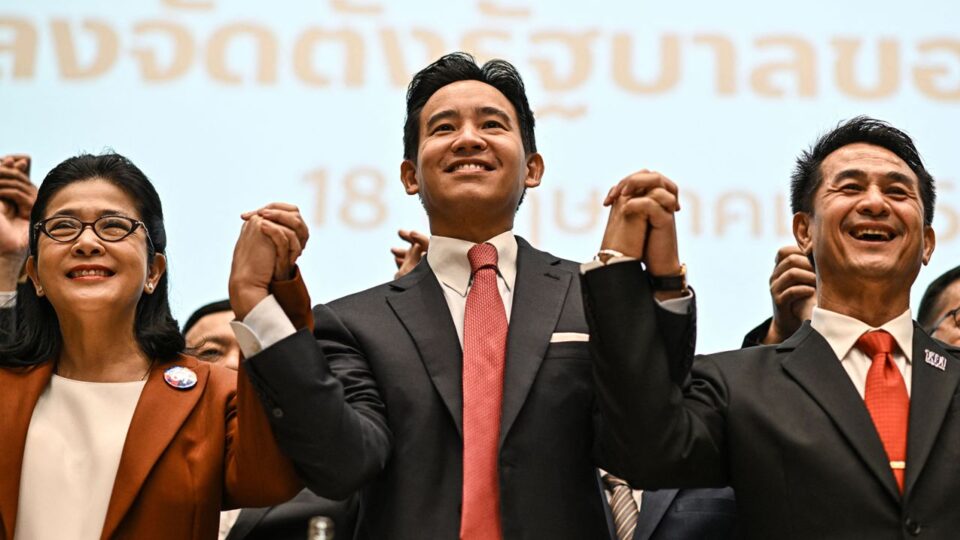Unifying royal insult law is not mentioned in the eight-party coalition’s ambitious reform agenda.
In order to form a government, Thailand’s progressive Move Forward Party signed a coalition agreement with seven other parties, promising to draft a new constitution, abolish monopolies, and permit same-sex marriage. However, the agreement omitted any mention of the contentious idea to change the country’s laws against royal insult.
The coalition’s policy aims and plans were defined in the 23-point agreement, which was revealed on Monday. The alliance is seeking backing from parliamentarians in order to establish a government following nine years of conservative, military-backed administration.In a resounding rejection of the royalist military-backed parties that have ruled the nation since a coup in 2014, Move Forward, along with Pheu Thai, a populist party connected to former Prime Minister Thaksin Shinawatra, topped last week’s poll.
Pita Limjaroenrat, the head of Move Forward and candidate for prime minister of Thailand, said, “This is another historic moment that shows we can transform the government to democracy peacefully.” The objective of this Memorandum of Understanding is to compile the agenda that all parties are prepared to advance in the executive and legislative branches of government.
On the ninth anniversary of the military takeover that installed Army Chief Prayuth Chan-ocha in charge, the signing took place.
Young voters who were enthused by a platform that puts the party at odds with some conservative business interests and institutions, such as a plan to amend a lese-majeste law that punishes perceived insults of the monarchy with up to 15 years in prison, helped Move Forward emerge as the surprise winner of the May 14 election and win the most parliamentary seats. According to the law’s detractors, Prayuth’s administration has used it to repress dissent.
However, the alliance members of Move Forward have voiced concerns, and a proposal to change that statute was not included in the agreement on Monday.Instead, it reaffirmed the monarch’s inviolable status and the nation’s “status as a democracy within a constitutional monarchy framework.”On Monday, Pita stated that he did not believe that his party’s separate effort to pursue lese-majeste legislation reform would alienate the upper house, whose support the coalition needs to name a prime minister and establish a government.
Even if the eight-party coalition holds a large majority of 313 seats in the lower house, it is not enough to guarantee that it will be able to seize power. The lower house and the Senate, whose 250 members were chosen by the military administration that ruled after the coup, jointly vote to pick the prime minister under the terms of the constitution that the military drafted. The winning candidate must receive at least 376 votes in order to win.
The lese-majeste controversy has led a number of senators to declare they will not vote for Pita.
Pita claimed that Move Forward has a team to describe how the law would be changed “so it cannot be used as a political tool” and “this will allay the senators’ concerns.”
The coalition’s agreement includes the majority of Move Forward’s core principles, including creating a new, more democratic constitution, legalizing same-sex unions, decentralizing administrative authority, and switching from conscription to voluntary enlistment in the military “except when the country is at war”.
Specifically, it calls for the elimination of business monopolies, particularly in the brewing and other alcohol production industries, and the restoration of controls on the production and sale of marijuana following Thailand’s poorly executed de facto decriminalization last year. It also calls for reforms of the police, military, civil service, and legal system.
Along with a balanced foreign policy that restores Thailand’s position as a regional leader in the Association of Southeast Asian Nations (ASEAN), it also calls for reforms in welfare and education.
All parties are free to advocate for additional policies “so long as they do not conflict with the policies set forth in this Agreement,” according to the clause.





